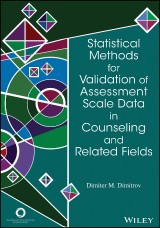Details

Statistical Methods for Validation of Assessment Scale Data in Counseling and Related Fields
1. Aufl.
|
61,99 € |
|
| Verlag: | American Counseling Association |
| Format: | |
| Veröffentl.: | 03.11.2014 |
| ISBN/EAN: | 9781119019299 |
| Sprache: | englisch |
| Anzahl Seiten: | 259 |
DRM-geschütztes eBook, Sie benötigen z.B. Adobe Digital Editions und eine Adobe ID zum Lesen.
Beschreibungen
<p><i>“Dr. Dimitrov has constructed a masterpiece—a classic resource that should adorn the shelf of every counseling researcher and graduate student serious about the construction and validation of high quality research instruments.</i></p> <p><b>—Bradley T. Erford, PhD</b></p> <p>Loyola University Maryland</p> <p>Past President, American Counseling Association</p> <p><i> </i></p> <p><i>“This book offers a comprehensive treatment of the statistical models and methods needed to properly examine the psychometric properties of assessment scale data. It is certain to become a definitive reference for both novice and experienced researchers alike.”</i></p> <p><b>—George A. Marcoulides, PhD</b></p> <p>University of California, Riverside</p> <p> </p> <p>This instructive book presents statistical methods and procedures for the validation of assessment scale data used in counseling, psychology, education, and related fields. In Part I, measurement scales, reliability, and the unified construct-based model of validity are discussed, along with key steps in instrument development. Part II describes factor analyses in construct validation, including exploratory factor analysis, confirmatory factor analysis, and models of multitrait-multimethod data analysis. Traditional and Rasch-based analyses of binary and rating scales are examined in Part III.</p> <p>Dr. Dimitrov offers students, researchers, and clinicians step-by-step guidance on contemporary methodological principles, statistical methods, and psychometric procedures that are useful in the development or validation of assessment scale data. Numerous examples, tables, and figures provided throughout the text illustrate the underlying principles of measurement in a clear and concise manner for practical application.<br /><br /></p> <p>*Requests for digital versions from ACA can be found on www.wiley.com. <br /> *To purchase print copies, please visit the ACA website <a href="https://imis.counseling.org/store/detail.aspx?id=72914">here</a>. <br /> *Reproduction requests for material from books published by ACA should be directed to <a href="mailto:permissions@counseling.org">permissions@counseling.org</a>.</p> <p> </p>
<p>Preface vii</p> <p>Acknowledgments ix</p> <p>About the Author xi</p> <p><b>PART I Scales, Reliability, and Validity</b></p> <p><b>Chapter 1 Variables and Measurement Scales 3</b></p> <p>1.1 Variables in Social and Behavioral Research 3</p> <p>1.2 What Is Measurement? 4</p> <p>1.3 Levels of Measurement 5</p> <p>1.4 Typical Scales for Assessment in Counseling 7</p> <p>1.5 Scaling 13</p> <p>Summary 20</p> <p><b>Chapter 2 Reliability 23</b></p> <p>2.1 What Is Reliability? 23</p> <p>2.2 Classical Concept of Reliability 24</p> <p>2.3 Types of Reliability 28</p> <p>2.4 Stratifi ed Alpha 35</p> <p>2.5 Maximal Reliability of Congeneric Measures 38</p> <p>Summary 39</p> <p><b>Chapter 3 Validity 41</b></p> <p>3.1 What Is Validity? 41</p> <p>3.2 Unifi ed Construct-Based Model of Validity 42</p> <p>Summary 50</p> <p><b>Chapter 4 Steps in Instrument Development 53</b></p> <p>4.1 Definition of Purpose 53</p> <p>4.2 Instrument Specifi cations 54</p> <p>4.3 Item Development 59</p> <p>Summary 64</p> <p><b>PART II Factor Analysis in Construct Validation</b></p> <p><b>Chapter 5 Exploratory Factor Analysis 69</b></p> <p>5.1 Correlated Variables and Underlying Factors 69</p> <p>5.2 Basic EFA Models 70</p> <p>5.3 The Principal Factor Method of Extracting Factors 73</p> <p>5.4 Rotation of Factors 76</p> <p>5.5 Some Basic Properties 79</p> <p>5.6 Determining the Number of Factors 81</p> <p>5.7 Higher-Order Factors 86</p> <p>5.8 Sample Size for EFA 87</p> <p>5.9 Data Adequacy for EFA 87</p> <p>5.10 EFA With Categorical Data 89</p> <p>5.11 EFA in Collecting Evidence of Construct Validity 90</p> <p>Summary 91</p> <p><b>Chapter 6 Confirmatory Factor Analysis 95</b></p> <p>6.1 Similarities and Differences of EFA and CFA 95</p> <p>6.2 CFA Model Specifi cation 97</p> <p>6.3 Dependent and Independent Variables in CFA 98</p> <p>6.4 CFA Model Parameters 99</p> <p>6.5 CFA Model Identification 100</p> <p>6.6 Evaluation of CFA Model Adequacy 102</p> <p>6.7 Factorial Invariance Across Groups 110</p> <p>6.8 Testing for Factorial Invariance 112</p> <p>6.9 Comparing Groups on Constructs 118</p> <p>6.10 Higher-Order CFA 122</p> <p>6.11 Points of Caution in Testing for Factorial Invariance 131</p> <p>6.12 Sample Size for CFA 133</p> <p>Summary 134</p> <p><b>Chapter 7 CFA-Based Models of Multitrait–Multimethod Data 143</b></p> <p>7.1 Conventional MTMM Analysis 143</p> <p>7.2 The Standard CFA Model 145</p> <p>7.3 The CU Model 147</p> <p>7.4 The CU–CFA Model 150</p> <p>7.5 The Correlated Trait–Correlated Method Minus One [CTC(M – 1)] Model 152</p> <p>7.6 The Random Intercept Factor Model 156</p> <p>7.7 The Hierarchical CFA (HCFA) Model 159</p> <p>7.8 The Multilevel CFA (ML-CFA) Method 162</p> <p>7.9 Conventional MTMM Analysis Using Latent Variable Modeling 165</p> <p>7.10 Brief Guidelines for Selecting Models of MTMM Data 167</p> <p>Summary 169</p> <p><b>PART III Psychometric Scale Analysis</b></p> <p><b>Chapter 8 Conventional Scale Analysis 175</b></p> <p>8.1 Analysis of Binary Scales 175</p> <p>8.2 Analysis of Rating Scales 181</p> <p>8.3 Estimation of Reliability for Congeneric Measures 186</p> <p>Summary 188</p> <p><b>Chapter 9 Rasch-Based Scale Analysis 191</b></p> <p>9.1 Rasch Model for Binary Data 191</p> <p>9.2 Rating Scale Model (RSM) 200</p> <p>Summary 216</p> <p>References 219</p> <p>Index 249</p>
<p><b>Dimiter M. Dimitrov, PhD,</b> is professor of educational measurement and statistics in the Graduate School of Education at George Mason University in Fairfax, Virginia.</p>
Diese Produkte könnten Sie auch interessieren:

The Wiley-Blackwell Handbook of Childhood Social Development

von: Peter K. Smith, Craig H. Hart

136,99 €

The Wiley-Blackwell Handbook of Childhood Social Development

von: Peter K. Smith, Craig H. Hart

28,99 €














